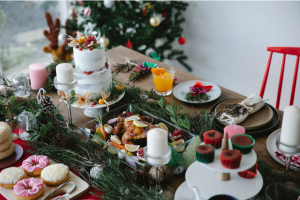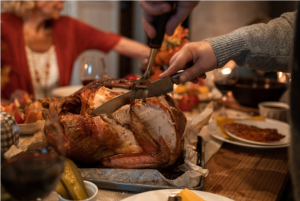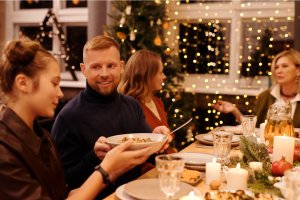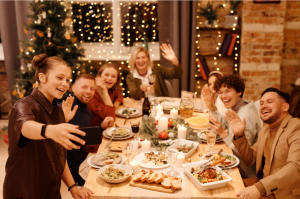 ‘Tis that time of year once again—the season of silver bells, hustle and bustle, holiday lights aglow, marked by friends and family gathering, and of course, an elaborate production of delectable treats! The holidays offer a chance to enjoy the company of loved ones, take part in traditions, practice gratitude, and indulge in festive foods together. However, navigating this period can be a challenge for many, with some either restricting or overindulging in their favorite culinary delights. Embracing mindfulness can be the key to fostering a healthier relationship with food and enhancing our overall eating experience. Below are some suggestions that you may find helpful in terms of discovering how you can relish the foods you adore (guilt-free!) throughout the holiday season!
‘Tis that time of year once again—the season of silver bells, hustle and bustle, holiday lights aglow, marked by friends and family gathering, and of course, an elaborate production of delectable treats! The holidays offer a chance to enjoy the company of loved ones, take part in traditions, practice gratitude, and indulge in festive foods together. However, navigating this period can be a challenge for many, with some either restricting or overindulging in their favorite culinary delights. Embracing mindfulness can be the key to fostering a healthier relationship with food and enhancing our overall eating experience. Below are some suggestions that you may find helpful in terms of discovering how you can relish the foods you adore (guilt-free!) throughout the holiday season!
So… What is Mindfulness Exactly?
It’s our ability to be fully present in the moment and being aware of our thoughts, feelings, bodies and surroundings. It also involves a non-judgmental and accepting attitude, recognizing with compassion that there is no “right” emotion or way to approach something at any given moment. When applied to food, mindfulness means being fully engaged in the act of eating, with heightened awareness of not just ourselves, but the food itself, and our surroundings. This involves utilizing all our senses to appreciate food in a fresh new way!
What are the Benefits of Mindful Eating?
The practice of mindful eating is not confined to the holiday season; it can be incorporated into our lives every day of the year. One of its most significant advantages, especially during the holidays, is the ability to savour and relish the foods we love. Additional benefits include heightened ability of tuning into our hunger and fullness cues, as well as increased pleasure from the food itself. Some studies even suggest that regular mindfulness practice can contribute to weight loss.
What Are Some Ways I Can Practice Mindful Eating?
 Engage all your senses: Whether you’re savouring a main course, indulging in dessert, sipping coffee, or mingling at a wine and cheese party, immerse yourself in the experience using your senses. Pay attention to the texture, temperature, scent and flavours of the food. Notice how the food is looks and is presented.
Engage all your senses: Whether you’re savouring a main course, indulging in dessert, sipping coffee, or mingling at a wine and cheese party, immerse yourself in the experience using your senses. Pay attention to the texture, temperature, scent and flavours of the food. Notice how the food is looks and is presented.- Honour your hunger and fullness scale: Tune into your body’s signals of hunger and fullness to avoid overeating. Acknowledge your hunger, even if it’s before a designated mealtime, and respond appropriately, whether with a small snack or a balanced meal. Likewise, check in to see if you feel full; maybe your body doesn’t need the second scoop on your plate.
- Practice self-care and coping mechanisms: Combat stress during the holidays with coping strategies that don’t involve food, like deep breathing, adequate sleep, hydration, gentle stretching, and moments of personal reflection or emotional check ins.

- Slow down and take breaks: Allow your brain to catch up with your stomach by eating slowly and chewing adequately. Put your utensils down between bites, engage in conversation, and relish the experience with friends and family.
- Take smaller portions: Enjoy a variety of holiday dishes by opting for smaller portions. You can always return for more if you’re still hungry, ensuring you relish without feeling overly full. This will also prevent you from taking a ride on the blood sugar roller coaster.
- Enjoy and express gratitude: Foster a positive relationship with food by giving yourself permission to enjoy your favorite treats. Express gratitude for the efforts involved in growing, farming, transporting, purchasing, stocking, creating recipes with, and preparing the food.
- Give yourself grace: Understand that mindfulness in eating doesn’t have to be perfect. It’s also not a “one and done”; it is called a practice for a reason. Aim for mindful eating whenever possible, acknowledging that occasional lapses don’t equate to failure or an unhealthy relationship with food.
 More Insights into Mindfulness: While mindfulness is beneficial throughout the year, its practice can be particularly valuable during the holidays. Continue honing these skills into the new year, remembering that food is a connects us to others, has value in traditions, and is a source of celebration, rather than shame or guilt. This holiday season, create space for your favourites with gratitude and see what that space gives back to you.
More Insights into Mindfulness: While mindfulness is beneficial throughout the year, its practice can be particularly valuable during the holidays. Continue honing these skills into the new year, remembering that food is a connects us to others, has value in traditions, and is a source of celebration, rather than shame or guilt. This holiday season, create space for your favourites with gratitude and see what that space gives back to you.
For personalized guidance on mindful eating, feel free to reach out to see what one-on-one coaching or group sessions can do for you.

